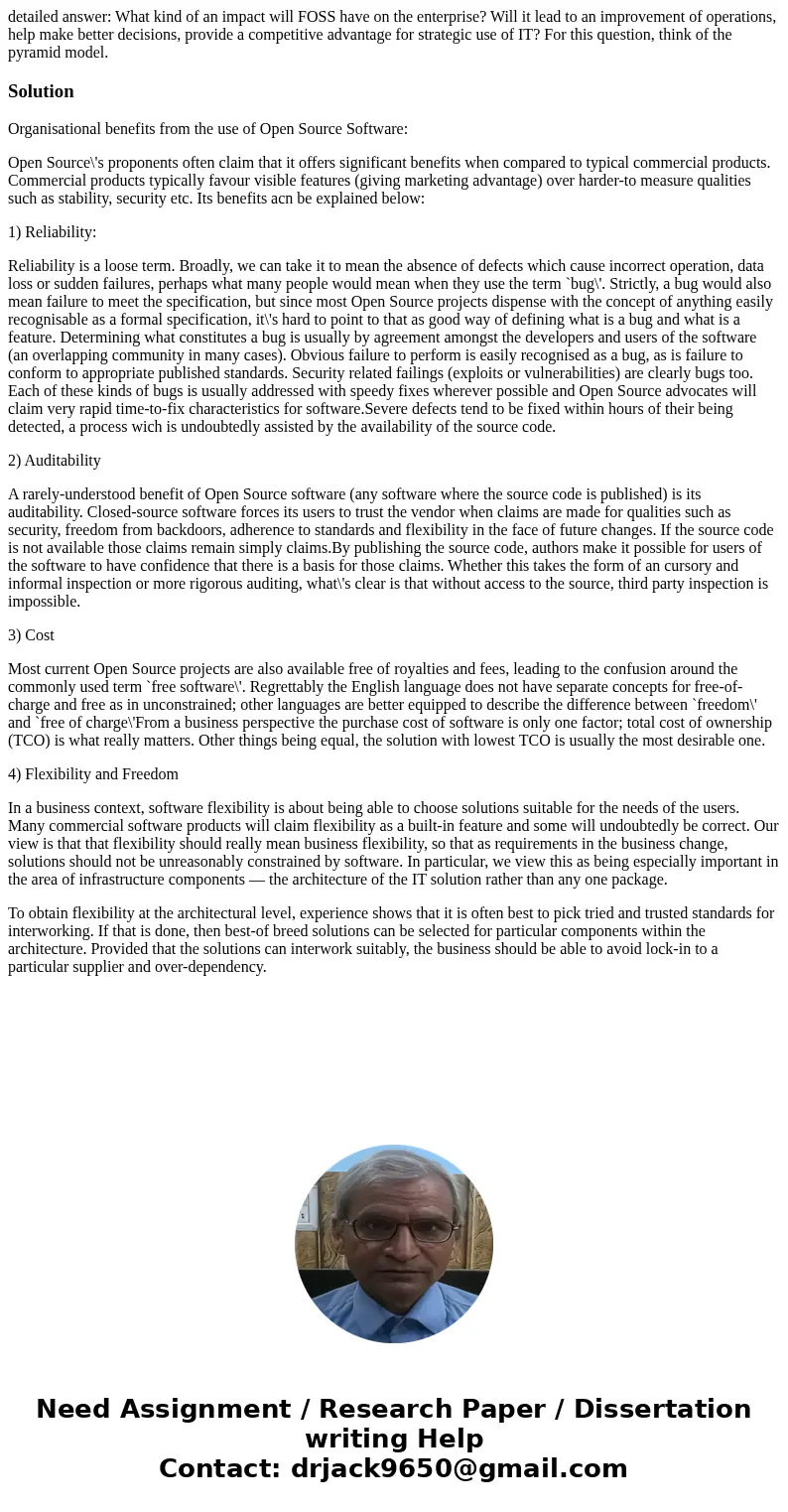detailed answer What kind of an impact will FOSS have on the
detailed answer: What kind of an impact will FOSS have on the enterprise? Will it lead to an improvement of operations, help make better decisions, provide a competitive advantage for strategic use of IT? For this question, think of the pyramid model.
Solution
Organisational benefits from the use of Open Source Software:
Open Source\'s proponents often claim that it offers significant benefits when compared to typical commercial products. Commercial products typically favour visible features (giving marketing advantage) over harder-to measure qualities such as stability, security etc. Its benefits acn be explained below:
1) Reliability:
Reliability is a loose term. Broadly, we can take it to mean the absence of defects which cause incorrect operation, data loss or sudden failures, perhaps what many people would mean when they use the term `bug\'. Strictly, a bug would also mean failure to meet the specification, but since most Open Source projects dispense with the concept of anything easily recognisable as a formal specification, it\'s hard to point to that as good way of defining what is a bug and what is a feature. Determining what constitutes a bug is usually by agreement amongst the developers and users of the software (an overlapping community in many cases). Obvious failure to perform is easily recognised as a bug, as is failure to conform to appropriate published standards. Security related failings (exploits or vulnerabilities) are clearly bugs too. Each of these kinds of bugs is usually addressed with speedy fixes wherever possible and Open Source advocates will claim very rapid time-to-fix characteristics for software.Severe defects tend to be fixed within hours of their being detected, a process wich is undoubtedly assisted by the availability of the source code.
2) Auditability
A rarely-understood benefit of Open Source software (any software where the source code is published) is its auditability. Closed-source software forces its users to trust the vendor when claims are made for qualities such as security, freedom from backdoors, adherence to standards and flexibility in the face of future changes. If the source code is not available those claims remain simply claims.By publishing the source code, authors make it possible for users of the software to have confidence that there is a basis for those claims. Whether this takes the form of an cursory and informal inspection or more rigorous auditing, what\'s clear is that without access to the source, third party inspection is impossible.
3) Cost
Most current Open Source projects are also available free of royalties and fees, leading to the confusion around the commonly used term `free software\'. Regrettably the English language does not have separate concepts for free-of-charge and free as in unconstrained; other languages are better equipped to describe the difference between `freedom\' and `free of charge\'From a business perspective the purchase cost of software is only one factor; total cost of ownership (TCO) is what really matters. Other things being equal, the solution with lowest TCO is usually the most desirable one.
4) Flexibility and Freedom
In a business context, software flexibility is about being able to choose solutions suitable for the needs of the users. Many commercial software products will claim flexibility as a built-in feature and some will undoubtedly be correct. Our view is that that flexibility should really mean business flexibility, so that as requirements in the business change, solutions should not be unreasonably constrained by software. In particular, we view this as being especially important in the area of infrastructure components — the architecture of the IT solution rather than any one package.
To obtain flexibility at the architectural level, experience shows that it is often best to pick tried and trusted standards for interworking. If that is done, then best-of breed solutions can be selected for particular components within the architecture. Provided that the solutions can interwork suitably, the business should be able to avoid lock-in to a particular supplier and over-dependency.

 Homework Sourse
Homework Sourse